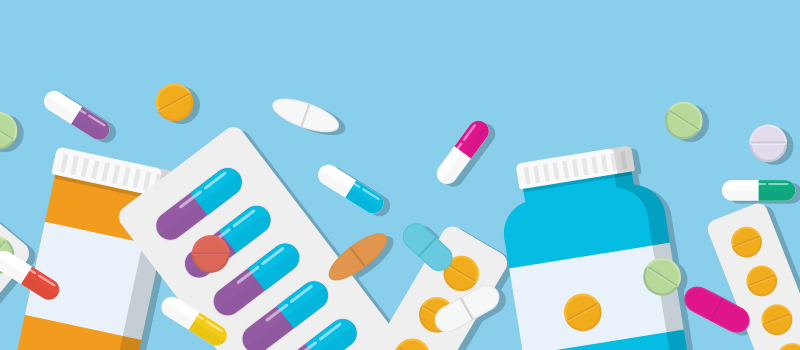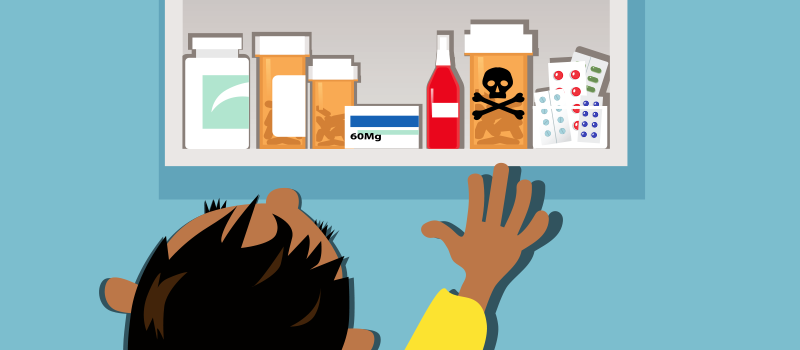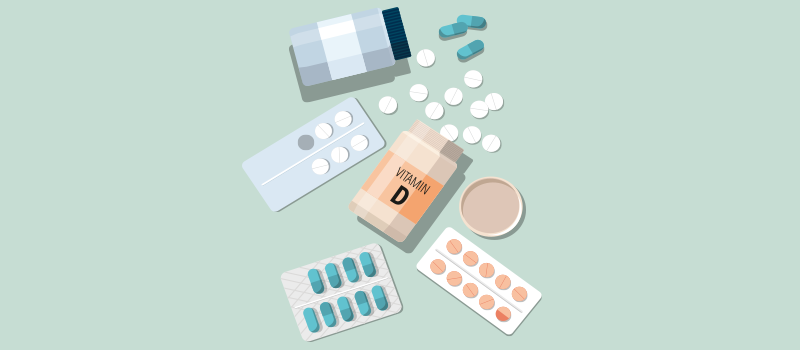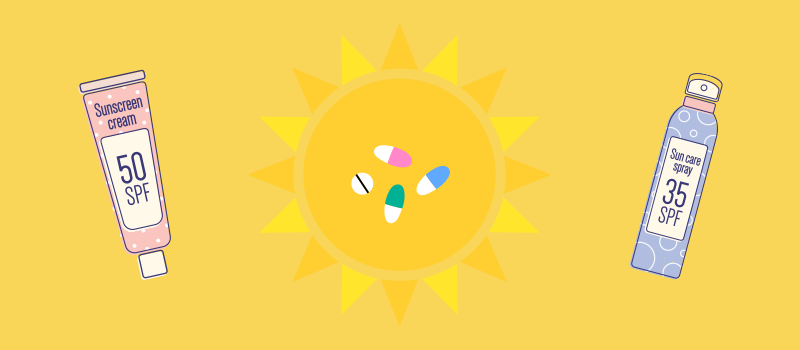What’s the Buzz
The Bee Healthy Blog
Medications That May Be Making You Sweat More

Do you wake up with sweat-soaked nightclothes and bed linen? Are you embarrassed because you sweat excessively even in the absence of hot weather or exercise? You’re not alone. Millions of people suffer from night sweats and excessive sweating. But what many people don’t know is that common medications can cause excessive sweating. Please continue reading to find out which medications can make you sweat more and what you can do about it.
What is drug-induced hyperhidrosis?
Drug-induced hyperhidrosis and hypohidrosis are excessive sweating or too little sweating that occur as a side effect of medications.
Hyperhidrosis is the medical term for excessive sweating. It occurs due to an overstimulation of the sweat glands by a neurotransmitter called acetylcholine. Primary hyperhidrosis is rare. It occurs early in life, and the exact cause is not known. Secondary hyperhidrosis occurs due to certain medical conditions or as a side effect of medications.
Other factors to consider are a family history of excessive sweating and other medical conditions such as menopause, obesity, diabetes, and hyperthyroidism.
The most common cause of secondary hyperhidrosis is drug-induced hyperhidrosis. Some drugs affect parts of the brain, such as the spinal thermoregulatory centers and sympathetic ganglia that control sweating. Other drugs block the action of acetylcholinesterase at the eccrine neuroeffector junction. This enzyme breaks down acetylcholine, and its blockage results in high levels of acetylcholine, a powerful stimulator of sweat production.
When your sweat is in excess of what is needed to maintain body temperature, it can lead to discomfort and lack of self-confidence.
What medications can cause excessive sweating and night sweats?
Pain Medications
Prescription and over-the-counter pain medications can cause excessive sweating. Examples include:
- Opiates (hydrocodone, oxycodone, fentanyl, morphine)
- Nonsteroidal anti-inflammatory drugs or NSAIDs such as celecoxib, ketorolac, nabumetone, naproxen sodium (Aleve)
- Naproxen sodium (Aleve)
- Dronabinol (Marinol), a synthetic cannabinoid treating chemotherapy-induced nausea and vomiting
Selective serotonin reuptake inhibitors and other psychiatric medications
Secondary hyperhidrosis can be the side effect of many psychiatric drugs, such as:
- Selective serotonin reuptake inhibitors (SSRIs) antidepressants (Prozac, Celexa, Lexapro)
- Serotonin and norepinephrine reuptake inhibitor (SNRI) antidepressants such as Effexor and Cymbalta
- Atypical antidepressant like Wellbutrin
- Tricyclic antidepressants (Elavil, Norpramin)
- Anticonvulsants (Tegretol)
- Antipsychotics (Clozaril, Haldol)
- ADHD medications (Adderall)
- Anxiolytics (BuSpar, Lunesta)
- Ergot alkaloids for migraine (Migranal)
- Dementia medications (Aricept)
- Parkinson’s medications (Sinemet)
- Stimulants for narcolepsy (Provigil)
Hormonal medications
Hormonal medicines can cause excessive sweating as a side effect. Examples include:
- Depo-provera for birth control
- Calcitonin (Fortical) for postmenopausal osteoporosis
- Raloxifene (Evista) for postmenopausal osteoporosis and to reduce the risk of breast cancer
- Somatropin (Genotropin) to replace growth hormone
- Synthroid for hypothyroidism (underactive thyroid)
- Testosterone
- Tositumomab (cancer drug)
- Diabetes medications (Glucotrol, insulin)
- Vasopressin to control frequent urination
- Steroid medications (prednisone)
Antimicrobials
Antibiotics and antiviral drugs are used to treat bacterial and viral infections, respectively. Some antimicrobials that can cause drug-induced hyperhidrosis include:
- Antibiotics (Rocephin, Cipro, Tequin, Avelox, Ketek)
- Antivirals (Acyclovir, Foscavir, Copegus)
- HIV medications (Sustiva, AZT)
High blood pressure and heart disease medications
- Calcium channel blockers (Norvasc, Adalat, Procardia, Calan)
- ACE inhibitors (Lotensin, Vasotec, Prinivil, Altace)
- Angiotensin II receptor blockers ARBs (Cozaar)
- Diuretics (Bumex)
- Beta-blockers (Coreg, Lopressor)
- Antiarrhythmic medications for irregular heartbeat (Digitek, Lanoxin, Rythmol, Betapace)
- Antiplatelet agents (Persantine)
- Alpha blockers (Cardura)
Skin medications
Some of the dermatological (skin) medications that can cause excessive sweating as a side effect include:
- Acne medicines like isotretinoin (Accutane)
- Topical steroids (betamethasone)
- Numbing medicines (lidocaine, Xylocaine)
- Selenium sulfide, Selsun Blue, Head & Shoulders Intensive Treatment
Gastrointestinal medications
Drug-induced hyperhidrosis can occur in people taking:
- Antidiarrheals (Lomotil)
- Antiemetics for vomiting (Anzemet)
- Anti-inflammatories (mesalamine)
- Proton pump inhibitors (omeprazole, rabeprazole)
Allergy and asthma medications
Drug-induced hyperhidrosis is a side effect of medicines such as:
- Corticosteroids (Aero-Bid)
- Antihistamines (Claritin, Dimetapp)
- Nasal decongestants (pseudoephedrine)
Cancer drugs
Some cancer treatment drugs can cause secondary hyperhidrosis:
Remember that this is not a complete list of medications that can cause drug-induced hyperhidrosis. They are just some of the most common medications that can cause excessive sweating as a side effect.
How to recognize drug-induced hyperhidrosis and hypohidrosis?
Primary hyperhidrosis usually occurs in areas where sweat glands are present in large numbers, such as the face, armpits, palms, and soles. Also, the sweating is generally less at night.
In contrast, drug-induced hyperhidrosis is more generalized and can affect any part of the body. It also occurs during sleep.
On the contrary, drug-induced hypohidrosis (too little sweating) increases the risk of heat exhaustion and heat stroke. Because acetylcholine acts on both sweat and salivary glands, hypohidrosis (too little sweating) is often accompanied by dry mouth, which is easier to recognize.
What to do if a medication is making you sweat too much?
If you think a medicine is making you sweat too much, you should consult the prescribing physician for treatment and prevention.
Your doctor may reduce the dose of the drug that is causing excessive sweating, change you to other effective treatments, or discontinue treatment with the medicine causing drug-induced hyperhidrosis.
If it is medically necessary to continue treatment with a medicine causing drug-induced hyperhidrosis, your doctor may prescribe medications and treatments to suppress sweating or to reduce symptoms. These may include:
- Antiperspirants like topical aluminum chloride
- Topical anticholinergic agents like oxybutynin gel and glycopyrrolate
- Oral anticholinergic medications like benztropine and oxybutynin
- Botulinum toxin (Botox) injections for axillary hyperhidrosis (excessive sweating in the armpits)
- Iontophoresis treatment
References:












SOCIAL